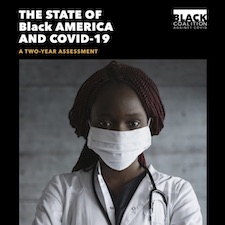 The Black Coalition Against COVID (BCAC) has released a new report that documents the long-standing health disparities in Black Americans revealed to many during the COVID-19 pandemic.
The Black Coalition Against COVID (BCAC) has released a new report that documents the long-standing health disparities in Black Americans revealed to many during the COVID-19 pandemic.
The two-year data assessment by the BCAC — which comprises several organizations and businesses and includes the four historically Black health science centers: Meharry Medical College; Howard University College of Medicine; Morehouse School of Medicine and Charles R. Drew University of Medicine and Science — found that at the beginning of the pandemic, Black Americans suffered the highest rates in COVID-19 infections, hospitalizations, and deaths. Even with early data on race and ethnicity limited, the impact of COVID-19 on Black Americans was substantially high. When data quality improved, reporting on race and ethnicity demonstrated that marginalized minority groups were disproportionately affected by COVID-19 and outcomes were exacerbated by pre-existing societal and structural issues not connected to genetic disposition.
According to the report, Black communities in the U.S. encountered more financial and emotional strain than other segments as more than one in six workers lost jobs between February and April 2020 and lost employer-based health care as a result. A September 2020 analysis in the report revealed that 13 percent of Black Americans were five times more likely to die from COVID in comparison to White Americans.
Also, Black children were significantly burdened by COVID-19 as one in 310 children lost caregivers compared to White children at a rate of one in 738. The study also suggested an uptick in mental health and substance abuse issues from emotional distress due to substantial loss.
Black workers were overrepresented in the service-based industries as essential workers, increasing the likelihood of COVID-19 infections compared to White workers, many more of whom were able to work from home. These conditions, paired with environmental toxins and diseases prevalent in Black communities such as diabetes, hypertension, and chronic kidney disease, caused further complications. Initially, Black Americans were more reluctant than Whites to get vaccinated.
The full report, The State of Black American and COVID-19: A Two-Year Assessment, may be downloaded here.










